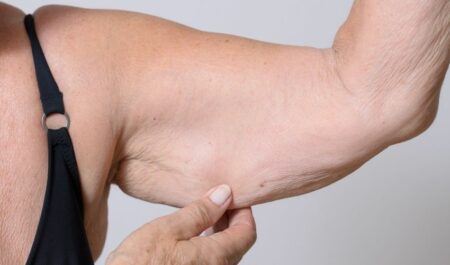Losing weight as part of a treatment plan for overweight or obesity can considerably cut the chance of developing several diseases. On the other hand, significant weight reduction can occasionally cause the skin to become lax. This might cause some people to experience emotions of self-consciousness and discomfort, both of which have the potential to be strong enough to negatively impact quality of life.This article examines the factors that lead to avoid loose skin after weight loss. In addition to this, it offers information on natural and medicinal remedies that may assist in the tightening of skin as well as the removal of loose skin.

After Losing A Significant Amount Of Weight, What Causes Skin Laxity?
The skin is the most extensive organ in the human body. It establishes a barrier of defense against the external environment.
Proteins, including collagen and elastin, make up the dermis, which is the deepest layer of your skin. Firmness and strength are imparted to the skin by collagen, which accounts for approximately 80% of the structure of the skin. Your skin is able to retain its firmness and elasticity thanks to elastin.
When a person gains weight, their skin stretches to accommodate their growing size. One example of this growth is the process of pregnancy.
The growth of the skin that happens during pregnancy takes place over the course of several months. The stretched skin will normally shrink back into place within a few months of delivery.
In contrast, damage to collagen and elastin fibers can occur when the skin is severely stretched and then left in that state for an extended length of time. As a direct consequence of this, a portion of their retractability is diminished.
As a direct result of this, when a significant amount of weight is lost, extra skin may hang off the body. The general rule is that the more weight that is lost, the more noticeable the effect of loose skin will be.
In addition, researchers have shown that people who undergo weight reduction surgery produce less new collagen, and the composition of the collagen that is produced is not as robust as the collagen that is found in the skin of young, healthy people.
The Factors That Contribute To A Decrease In The Suppleness Of The Skin.
After significant weight loss, loose skin can be caused by a number of circumstances, including the following:
The Period Of Time.
In general, the longer a person has been overweight or obese, the more elastin and collagen will be lost in their skin following weight loss, which will cause the skin to become looser.
The Amount Of Weight That Was Shed.
A weight reduction of 100 pounds (46 kg) or more, on the other hand, will often result in a larger level of skin laxity than a weight loss that is more modest.
Age.
Skin that is older has a lower collagen content than skin of a younger age and has a tendency to become laxer after a weight reduction.
Genetics.
It’s possible that your genes influence how your skin reacts when you gain or lose weight.
Sun Exposure.
It has been demonstrated that prolonged exposure to the sun reduces the formation of collagen and elastin by the skin, which may lead to sagging skin.
Smoking.

Smoking causes a decrease in the formation of collagen as well as damage to the collagen that already exists, which results in skin that is lax and saggy.
Problems Associated With Having An Excessive Amount Of Loose Skin.
Some persons have both physical and mental difficulties as a result of the loose skin that results after significant weight loss:
Discomfort experienced in the body Excess skin could make you feel uncomfortable and might even get in the way of everyday activities. According to the findings of one longitudinal research, one may experience an increase in self-consciousness after successfully losing weight.
Decreased amount of time spent physically active. Despite the fact that one study revealed that weight reduction encouraged more people to exercise, another study discovered that extra skin made it difficult for some people to exercise after they had bariatric surgery.
Irritation of the skin and skin disintegration. According to the findings of one study, of 124 persons who wanted plastic surgery to tighten skin following weight reduction surgery, 44 percent had experienced skin discomfort, ulcers, or infections due to the loose skin. The weight loss surgery had caused the loose skin in the first place.
Lacking positive body image. It’s possible that having loose skin after losing weight will have a negative impact on both your body image and your attitude.
Natural Ways To Tighten Slack Skin.
People who have lost a modest to moderate amount of weight may benefit, at least to some extent, from the use of the following natural therapies, which have the potential to enhance the skin’s firmness and suppleness.
Carry Out Certain Forms Of Resistance Exercise.
Strength training on a consistent basis is one of the most effective strategies for individuals of any age to add muscle growth, and this is true for both younger and older persons.Even while there isn’t much study on the subject right now, it’s feasible that increasing the amount of muscle mass in your body might assist improve the look of loose skin.
Think About Collagen.
The similarities between gelatin and collagen hydrolysate are striking. A processed version of the collagen that is naturally present in the connective tissue of animals, this substance is known as gelatin.
Studies show that collagen hydrolysate may have a protective impact on the collagen found in the skin; however, this hypothesis has not been tested on persons whose skin has become lax as a result of significant weight loss.
After 12 weeks of taking a liquid collagen supplement, a controlled study found that skin elasticity, along with smoothness and moisture, had dramatically improved after taking the supplement. The beverage also included trace amounts of biotin and zinc in addition to vitamins C and E.
The term “hydrolyzed collagen” can also be used to refer to “collagen hydrolysate.” It may be found in the form of powdered supplements in natural food stores as well as on the internet.
Bone broth, which also contains other nutrients that are beneficial to one’s health, is another common source of collagen.
Consume Specific Nutrients, And Make Sure You’re Getting Enough Water.
For the formation of collagen and other components of healthy skin, several nutrients are essential, including the following:
Protein.
A sufficient amount of protein is essential for maintaining good skin. Lysine and proline are two essential amino acids that contribute directly to the formation of collagen.
Vitamin C.
Collagen formation requires vitamin C, which also has the added benefit of preventing UV damage to the skin.
Omega-3 Fatty Acids.
There is some speculation that the omega-3 fatty acids present in fatty fish might help improve the suppleness of skin and slow the aging process.
Water.

Maintaining a healthy level of hydration may result in improved skin look. According to the findings of one study, women who increased the amount of water they drank each day had substantial changes in the hydration and function of their skin.
Apply Firming Creams To Your Skin.
Collagen and elastin are common ingredients in “firming” lotions.
Although using these lotions may provide a momentary improvement in the appearance of skin firmness, collagen and elastin molecules are too big to be absorbed through the skin in this manner. In most cases, the production of collagen must begin from the inside and work its way out.
Surgical Procedures And Medical Therapies To Tighten Lax Skin.
When it comes to tightening loose skin following significant weight loss, medical or surgical therapies are the more intrusive possibilities.
Surgical Procedures That Sculpt The Body.
People who have lost a substantial amount of weight through bariatric surgery or other means of weight loss frequently desire surgery to remove extra skin after they have achieved their weight loss goals.
During body-contouring surgery, the surgeon will make a wide incision and then remove extra fat and skin from the patient’s body. After that, they close the incision using very little stitches so that there is as little scarring as possible.
The Following Are Examples Of Specific Body-Contouring Surgeries:
Abdominoplasty, sometimes known as a “tummy tuck,” is the surgical excision of excess skin from the abdominal region.
During a lower-body lift, excess skin is removed from areas such as the abdomen, buttocks, hips, and thighs.
- Excision of excess skin from the breasts and back are both components of an upper-body lift.
- Skin is removed from the patient’s inner and outer thighs during a procedure called a medial thigh lift.
- Arm lift surgery, also known as brachioplasty, involves the excision of excess skin from the upper arm.
- After a significant reduction of weight, patients often have a series of surgical procedures on various areas of the body over the course of one to two years.
In most cases, a hospital stay of between one and four days is necessary following body-contouring surgical procedures. The usual length of time needed to recover at home is between two and four weeks. There is also a possibility that the operation will result in certain problems, such as bleeding and infections.
After a large weight reduction, some people find that having body reshaping surgery helps enhance their quality of life. In spite of this, one research found that those who underwent the surgery had lower quality of life scores than those who did not.
Methods Of Complementary And Alternative Medicine.
Even though body contouring surgery is by far the most popular operation for removing excess skin, there are other choices that are less invasive and have a reduced risk of problems. These alternatives include the following:
The Use of Radiofrequency Energy.
Infrared light, radiofrequency energy, and massage are all possible components of these kinds of therapies for tightening loose skin. This medication does not cause weight reduction; rather, it may be helpful in reducing fat cells in localized parts of the body.
Ultrasound.
People who underwent bariatric surgery were given ultrasound therapy, and the results of the study showed that there was no objective change in loose skin. Despite this, many stated that the therapy reduced their levels of pain as well as other symptoms.
It would appear that the effects of these alternative methods, despite the fact that there are less hazards associated with them, may not be as spectacular as those achieved by body-contouring surgery.
The Conclusion
After significant weight loss, many people find that they have additional skin that is loose. If the loose skin is making you uncomfortable, you could decide to get some treatment for it.
When you lose a modest to not too significant quantity of weight, it’s conceivable that your skin may retract on its own. There is hope in the form of natural home treatments.
However, if you lose a large amount of weight, you could require body-contouring surgery or another type of medical operation to get rid of loose skin or to tighten the skin you have.
